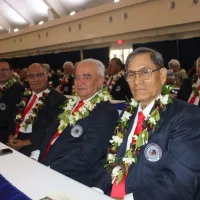
A bill, now, before the Senate seeks to amend the qualification of candidates running for the offices of Governor and Lt. Governor of American Samoa.
At present, candidates for the top two positions of the executive branch of the government have to be either a United States citizen or a US national. The bill introduced by Senator Togiola Tulafono would add that candidates must be of American Samoan ancestry. American Samoan ancestry means an individual of American Samoan descent born in American Samoa, Swains, or the United States of America.
The bill would also require that a candidate for the two positions be an actual resident of the territory for at least 24 consecutive and continuous calendar months before filing a petition as a candidate for Governor or Lt. Governor.
In addition, they must be a resident of American Samoa for at least 5 years prior to filing a petition to run for Governor or Lt. Governor.
Current law states that a candidate must be a bona fide resident.
Other qualifications remain unchanged under the proposed legislation.
These include that the candidate must be 35 years, or older, and that persons convicted of a felony under the laws of American Samoa, the United States or the laws of any state in the United States is not eligible.
Also unchanged is the waiver on the residency requirement for those serving in the Armed Services of the United States, working for the US Government or any of its agencies, in service to the (American Samoa) Government or its agencies or in the pursuit of education.
According to the bill’s preamble, affirming the US citizenship or US national status of candidates with American Samoa ancestry ensures that our leaders have a genuine and strong connection to the cultural and historical roots of American Samoa. Requiring residency ensures that aspiring leaders are well acquainted with local issues and community needs, and establishing these standards will improve quality leadership by attracting sincerely invested candidates in our territory.
“It will promote stability and community governance through meaningful and uninterrupted residency requirements,” says the bill.



